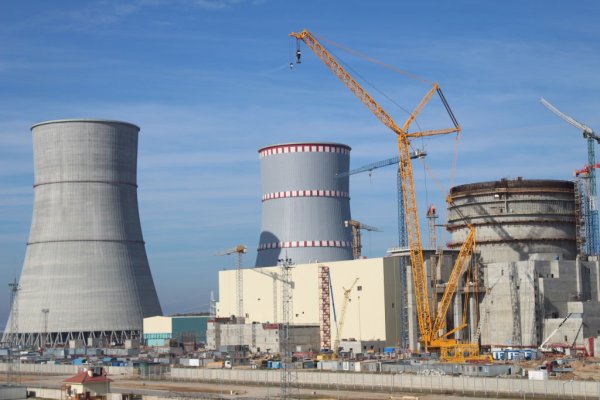- Joined
- Apr 18, 2013
- Messages
- 94,136
- Reaction score
- 82,405
- Location
- Barsoom
- Gender
- Male
- Political Leaning
- Independent
Lithuania Fears New Belarusian Nuclear Plant Hasn't 'Learned Lessons Of Chernobyl'

Moscow paid $10 billion dollars for this project, but made sure it was located as far away from Russia as possible.
Unlike the 15 nuclear reactors in neighboring Ukraine, the Astravets reactor in Belarus will not be inspected and certified by Euratom, the European Atomic Energy Community.

1/13/20
ASTRAVETS, Belarus -- Mikalay Ulasevich was running in municipal elections in July 2016 when a local resident alerted him to a major accident at a nuclear power plant under construction close to this town in northwestern Belarus. Workers had dropped a 330-ton reactor vessel from a height of several meters while attempting to install it, he was told, and officials were trying to keep the incident under wraps. "Everybody knew about it, or almost everybody, but no one dared reveal it publicly," Ulasevich recalled recently at his house in the nearby village of Varnyany, with the plant's gargantuan cooling towers visible on the horizon. "They'd be putting themselves in the firing line." But it wasn't until two weeks after he learned of the incident that he decided to share the news. In a Facebook post questioning the project's safety record, he asked whether Belarusian officials had notified the International Atomic Energy Agency (IAEA) of the accident or told neighboring Lithuania, whose capital, Vilnius, lies a mere 40 kilometers from the Astravets plant. It's likely the small Baltic country was already aware. Since the project was announced by presidential decree in 2008, backed by a $10 billion loan from Moscow, Lithuanian officials have waited with trepidation for Minsk to declare construction complete. Now, with its delayed launch slated to take place within months, their campaign to scupper those plans has shifted into high gear. "This is a threat to our national security, public health, and environment," Lithuanian Energy Minister Zygimantas Vaiciunas told RFE/RL in an interview in Vilnius. "The key question is the site selection, which was done politically -- geopolitically." Eastern Europe knows that nuclear power can be both a blessing and a curse. The April 1986 explosion of Reactor No. 4 at the Chernobyl plant, just south of Belarus in Ukraine, reverberated with catastrophic consequences as tainted clouds spread deadly radioactive particles across the region. Because of its location downwind from Chernobyl, Belarus bore the brunt of that fallout. "The lessons that were given 30 years ago in Chernobyl have not been learned," Vaiciunas said.
The site near Astravets will run third-generation pressurized-water reactors distinct from earlier models used in Japan and Ukraine and equipped with safety measures aimed at precluding the kind of accidents that happened there: from so-called passive safety systems capable of triggering an automatic shutdown to a "core catcher" device installed in a concrete pit beneath the reactor that would trap molten fuel in case of overheating and make it nearly impossible for radiation to infiltrate the environment. Lithuania says Belarus is launching its first reactor without completing all stages of a "stress test" -- an EU risk-and-safety assessment of a plant's ability to withstand damage from hazards. But supporters of the project say that since Belarus is not an EU member, it is not obliged to complete the stress test, and the checks it did carry out were done voluntarily. "Safety depends not only on the design -- it depends also on the site," said Darius Lukauskas, deputy head for radiation safety at Lithuania's nuclear energy regulator. "You have to answer three questions: where the plant is, what kind of facility it is, and how it is constructed." But access to the plant itself and the surrounding area are strictly controlled, with a dedicated security detail stopping people who take photos and occasionally detaining journalists. In Vilnius, officials acknowledge they have no way of preventing the plant's launch, or strong-arming Belarus into making concessions over its sovereign territory. But Vaiciunas hopes that the country's continued vocal opposition will encourage countries and companies to boycott the project, just as it has done. When the Chernobyl catastrophe struck, he said, "the key problem was not the accident itself, but the fact nobody was talking about it." "That's the fear for us," he said. "You can't trust a country which is not communicating with you."
Moscow paid $10 billion dollars for this project, but made sure it was located as far away from Russia as possible.
Unlike the 15 nuclear reactors in neighboring Ukraine, the Astravets reactor in Belarus will not be inspected and certified by Euratom, the European Atomic Energy Community.
